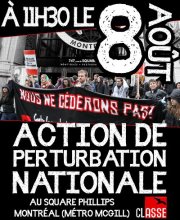While the world watches the Olympics and the US roasts in endless heat, Montréal is marking day 175 in the student strike and gearing up for a decisive few weeks. At the start of August, Liberal prime minister Jean Charest called an early election for September 4. While his official platform rests on his climate-disaster $80 billion package of forestry and mining expansion, Charest will also be judged on the student strike.
For students and their allies, the elections mark a time of decision. Some student leaders, like Leo Bureau Blouin, have joined the Parti Quebecois to protest the Law 78. There’s a risk of being co-opted here, clearly. Meanwhile the CLASSE meets on August 11-12 to decide on its next steps, and how to continue the strikes. There’s an action on August 8th to gather people.
From August 13-17, there’s a key test of the strength of student opinion, as students are supposed to return to class. On August 22, there is a national demonstration, optimistically billed as the largest demonstration in history:
And just for once even faculty are not breaking ranks. The newly formed “Profs Contre la Hausse” (Profs against the Hike) have issued a hard-hitting manifesto, in classic Francophone style, which was published today.
It begins (I’m using their translation):
We do not see ourselves as mere agents of the reproduction of the social order, and especially as not officers of the repression with which Quebec’s state power has decided to contemptuously attack the student community.
The document outlines the absurdities of the new Law that prevents “gatherings” within 50 metres of a class and requires faculty to inform on their students, amongst other provisions that are rightly characterized as “Orwellian.” They conclude with some paragraphs that would probably get about 25 signatures where I teach. They have over 2000:
We refuse to contribute to the production of a world characterised by the war of all against all, by market logic, by mutual surveillance, by informants, self-censorship, and fear.
We reject the idea that respecting the contract between an academic institution and a student, legitimizes the violence exercised by the state against collective political rights – rights to associate, to express one’s opinion freely, to make collective decisions, to strike, and to demonstrate.
We reaffirm that decisions taken in a democratic way, by associations whose legitimacy is recognized by the law, are themselves legitimate.We respect the strike vote of the students. We recognize their right to protest at their educational institutions and to interrupt the activities which are carried out there as the only means by which they have bargaining power.
We would not know how to teach in contravention of these principles.
It is the last sentence that resonates: these educators have reached their limit, the place beyond which they cannot consider themselves still defined by learning rather than police functions. Let us hope their example is contagious.


